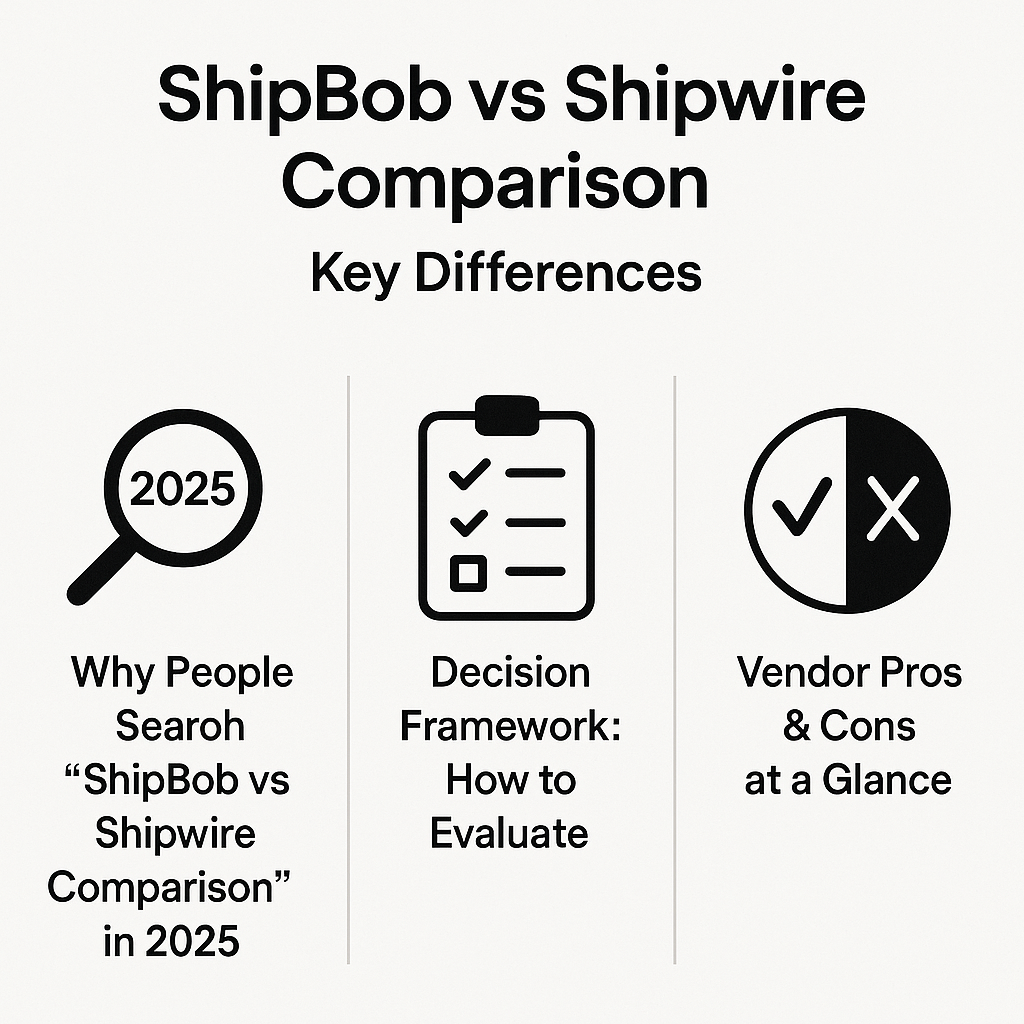
ShipBob vs Shipwire Comparison
Choosing the right third-party logistics provider is crucial for your business’s success. In this ShipBob vs Shipwire comparison, we’ll explore the key differences to help you make an informed decision. Whether you’re a logistics manager or an ecommerce founder, understanding these nuances can significantly impact your operations.
Why People Search ‘ShipBob vs Shipwire Comparison’ in 2025
In 2025, the logistics landscape is more dynamic than ever, with AI forecasting and sustainability taking center stage. Businesses are increasingly looking for 3PLs that not only meet their operational needs but also align with their values. The search for a ‘ShipBob vs Shipwire comparison’ often stems from the need to balance cost-efficiency with service quality.
- Consider how AI-driven analytics can optimize your supply chain with either provider.
- Evaluate the sustainability initiatives of each company to align with your corporate responsibility goals.
- Assess how each provider’s network can support your growth in new markets.
Decision Framework: How to Evaluate
When evaluating ShipBob and Shipwire, it’s essential to consider several key criteria. First, assess your business’s specific logistics needs, such as the volume of shipments and the geographic areas you serve. Next, consider the technological capabilities of each provider, including their integration with your existing systems. Finally, think about the level of customer support you require.
- Map your logistics needs to each provider’s strengths. For example, if you need extensive warehouse coverage, compare their network reach.
- Evaluate the ease of integration with your ecommerce platform, as seamless operations can save time and reduce errors.
- Consider the scalability of each provider’s services to ensure they can grow with your business.
Vendor Pros & Cons at a Glance
- ShipBob Pros: Extensive warehouse network, strong tech integration, responsive customer service.
- ShipBob Cons: Higher costs for small businesses, limited international reach.
- Shipwire Pros: Competitive pricing, robust international logistics, flexible service options.
- Shipwire Cons: Complex onboarding, less intuitive tech platform.
ShipBob excels in technology and customer service, making it ideal for tech-savvy businesses. However, its costs can be prohibitive for smaller players. Shipwire offers cost-effective solutions and international reach, but its platform may require a steeper learning curve.
Pricing & Total Landed Cost: What Really Moves the Number
Understanding the pricing models of ShipBob and Shipwire is crucial for calculating your total landed cost. ShipBob typically offers transparent pricing with a focus on technology-driven efficiencies, while Shipwire provides more flexible pricing structures that can be tailored to different business sizes and needs.
- ShipBob’s pricing includes storage, picking, and packing fees, which can add up for high-volume businesses.
- Shipwire offers a pay-as-you-go model, which can be more cost-effective for startups and seasonal businesses.
- Consider additional costs such as returns processing and custom packaging when comparing total costs.
While ShipBob’s pricing is straightforward, it may not be the most economical for smaller businesses. Shipwire’s flexible pricing can be advantageous if your business experiences seasonal fluctuations.
Feature-by-Feature Comparison
- Warehouse Network: ShipBob offers a broad network across the U.S., while Shipwire provides international options.
- Technology Integration: ShipBob excels with seamless integrations, whereas Shipwire’s platform may require more customization.
- Customer Support: ShipBob is known for responsive support, while Shipwire offers more self-service options.
- Scalability: Both providers offer scalable solutions, but Shipwire’s flexibility may better suit rapidly growing businesses.
ShipBob’s technological edge and customer support make it a strong contender for businesses prioritizing these aspects. However, Shipwire’s international reach and flexible pricing offer significant advantages for businesses looking to expand globally.
Scenario Playbook: Who Should Choose What?
- If your business is primarily U.S.-based and tech-driven, ShipBob’s seamless integrations and support make it a strong choice.
- For businesses looking to expand internationally, Shipwire’s robust global logistics capabilities are advantageous.
- Startups or seasonal businesses may benefit from Shipwire’s flexible pricing and service options.
Onboarding & Risk Mitigation
Onboarding with a 3PL can be a complex process, but both ShipBob and Shipwire offer structured programs to ease the transition. ShipBob’s onboarding is streamlined with a focus on technology integration, while Shipwire provides a more customizable approach, which can be beneficial for businesses with unique logistics needs.
- Plan for a comprehensive onboarding timeline to ensure all systems are fully integrated before going live.
- Consider potential risks, such as data migration issues, and have contingency plans in place.
- Engage with customer support early to address any concerns during the onboarding process.
Expert Take
Having consulted for numerous ecommerce businesses, I’ve seen firsthand how choosing the right 3PL can transform operations. One client, a mid-sized retailer, switched to ShipBob for its tech capabilities, resulting in a 20% reduction in order errors. However, another client found Shipwire’s international reach invaluable for their global expansion. Ultimately, the choice depends on your specific needs and growth plans.
Further Reading
FAQs
How do pricing models differ for ‘ShipBob vs Shipwire comparison’?
ShipBob offers transparent pricing with fixed fees, while Shipwire provides flexible, usage-based pricing.
What support model should I expect?
ShipBob offers responsive customer service, whereas Shipwire provides more self-service options.
Which industries benefit most?
Tech-driven and U.S.-based businesses benefit from ShipBob, while global and cost-sensitive businesses may prefer Shipwire.
How long does onboarding take?
Onboarding can vary, but typically takes a few weeks for both providers, depending on complexity.
Can multi-node reduce both cost and transit time?
Yes, utilizing multiple nodes can optimize both cost and delivery speed, especially with Shipwire’s international network.
Next Steps
Ready to make a decision? Compare quotes or schedule a consultation to find the best fit for your logistics needs.

Leave a Reply